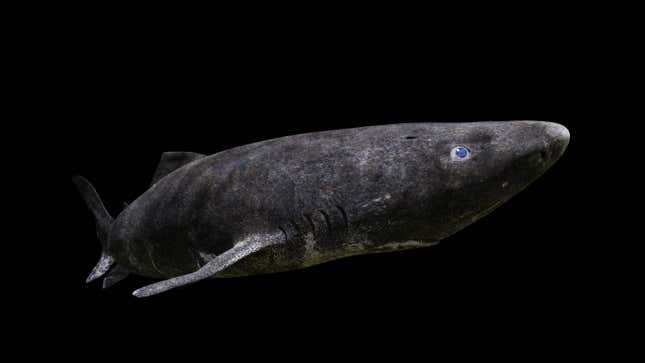
One of the strangest and longest-lived species of shark has been spotted far beyond its usual haunts. In new research this month, marine biologists report having found a sleeper shark in the western Caribbean waters near Belize for the first time. The discovery is the latest to suggest that these enigmatic creatures, typically seen in the Arctic, may be more common and widespread in the waters of the deep than previously thought.
The sighting happened this April by researchers from Florida International University. With the help of local fishermen, they had been trying to tag tiger sharks at Glover’s Reef, a coral atoll in Belize, when they captured something else: a small-eyed, grayish, roughly 11-foot-long fish, pulled from the water’s depths. When the beast was brought to the surface, it was especially slow-moving and quite unlike any fish that the team had come across before.
“I knew it was something unusual and so did the fishers, who hadn’t ever seen anything quite like it in all their combined years of fishing,” said Devanshi Kasana, a Ph.D. candidate at the Florida International University Predator Ecology and Conservation lab, in a statement from the university.

Due to incoming storms and not wanting to endanger the creature, the group quickly released their catch, though not before documenting it. Upon consultation with other experts, they soon surmised that they had briefly met a sleeper shark. Their findings were published this month in Marine Biology.
Sleeper sharks are named for their sluggish behavior. Even in their usual deep-water setting, they swim slowly and expend little energy in hunting or scavenging for food, often catching their prey while they’re asleep. Perhaps the most well-known sleeper shark, the Greenland shark (Somniosus microcephalus), may also be one of the longest-lived animals in the world, with a lifespan thought to extend up to 400 years. Though these sharks could in theory snack on a human, their natural environment is far from human activity and no attacks have ever been reported. Their bodies are also normally toxic to us, thanks to the adaptations they’ve made to survive in the depths, but Icelandic people have figured out a way to eat them anyway, and cured Greenland shark flesh is a local delicacy. Due to the shark’s large size, the researchers believe they either captured a Greenland shark or the hybrid offspring of a Greenland and a related species called Somniosus pacificus.
Though these sharks are typically thought to spend most of their time in the frigid waters of the Arctic, some populations do seem to migrate, and there have been occasional sightings around the tropics in recent years, including in the Caribbean. This latest sighting adds another wrinkle, though, since the team was much closer to the shore than other teams have been when they stumbled upon their tropical sleeper. But because the reef has waters that reach as far down as 9,500 feet, there is a plausible source of cold temperatures available for these sharks to live comfortably. Since we know so little about these sharks, they could be much more widely distributed around the world than currently documented.
The team plans to continue studying the deep sea fish of Belize. And though they’re not necessarily expecting to spot a sleeper shark again, they will be carrying specialized tags from now on to monitor any potential specimens they do encounter, just in case.